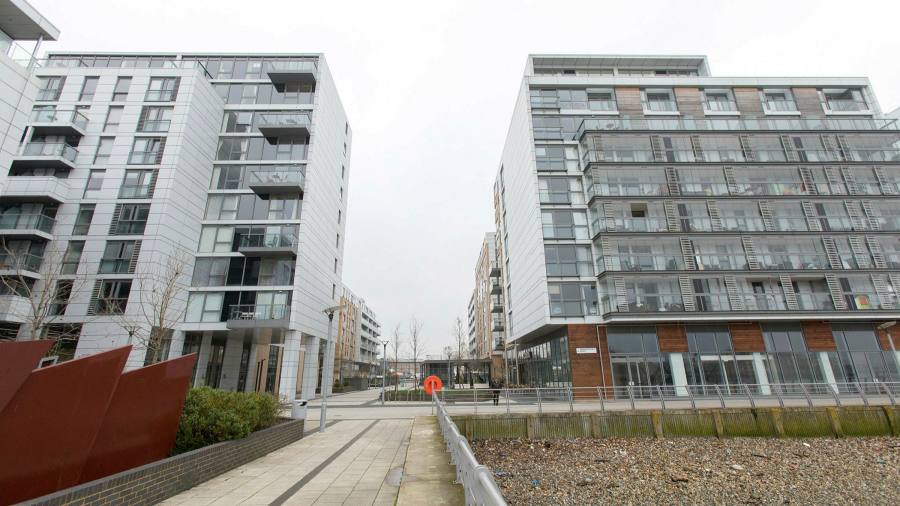[ad_1]
In JG Ballard’s High-Rise, a luxury apartment block descends into civil war as the building’s promised build quality fails to live up to scratch. For some, the 1975 novel might feel a little too close to home.
Nearly four years have passed since the Grenfell Tower fire in London, which killed 72 people. The building’s exterior cladding caused the fire to engulf the tower rather than contain it within the flat where it started.
But reforms to tackle the problem have had unintended consequences for many homeowners. Millions of tower block residents are now unable to finance a move on a property or even remortgage, with lenders fearful that the underlying collateral might not be safe.
While the potential to save lives does not always make an issue a government priority, threats to the property market spur it into action. Housing secretary Robert Jenrick announced on Wednesday that it will provide £3.5bn of extra funding to tackle the crisis, with a levy on homebuilders to boot.
The industry clearly anticipated the news. Earlier in the day, Persimmon — market cap £8.7bn — revealed a provision of £75m to fix the problem at 26 developments it had built, with chairman Roger Devlin saying it had “a clear duty to act to address this issueâ€. Last week, rival Barratt Development’s chief executive David Thomas called for a levy on the sector as they had a “collective responsibility to be a part of the solutionâ€.
Given the scores of negative online reviews, bad press and general public opprobrium towards the sector it is understandable that homebuilders are looking for a PR win. Whether it makes any difference operationally is another matter. The fact analysts are not particularly bothered by profit-eating provisions is a tell. UBS reckons Persimmon will be able to recover some of the costs from the freeholders that bought the projects. Analysts at Goodbody, meanwhile, praised a “proactiveâ€â€‰approach without even mentioning profit.
It does look like a non-issue financially. Persimmon, Barratt and Taylor Wimpey together had over £3bn of net cash at the most recent count and generated two-thirds of that in ebitda over the past 12 months. Redrow, which put out interim results on Wednesday, reported a 11 per cent year-on-year rise in pre-tax profits to £174m. The cladding crisis was not mentioned in its statement.
Is it business as usual then for the homebuilders? Perhaps. With hopes of a further extension to the stamp duty holiday ebbing and house prices beginning to wane, the sector is due a pause. Yet given the UK’s proclivity for propping up the housing market through policy, betting against the sector still seems a thesis built on shaky foundations.
Equiniti: hush money
The Takeover Panel can rival Harold Pinter for meaningful silences, writes Bryce Elder.
Take the curious case of Equiniti, the London-listed provider of share registration services to most FTSE 100 companies. Late on Monday, Sky News reported that Siris Capital had offered £600m for Equiniti — the latest in a string of takeover offers from the US private equity group. A reported price of 170p per share was more than 46 per cent above the previous day’s close.
In response, Equiniti shares shot up to just below the putative takeover value. Then nothing. No statement, no steer, no comment from either side. But while the stock has since drifted back towards 140p, the silence speaks volumes.
First, as Equiniti would be obliged to correct anything in the market that was misleading and price sensitive, its lack of reaction suggests the bid story was right. (People familiar with the companies agree with this interpretation.)
Second, though the Takeover Panel has a remit to prevent false markets, the onus for a statement falls on the acquirer rather than its target. Silence from Siris suggests the Panel saw fit to grant a dispensation, having in the words of the Takeover Code been satisfied “that the potential offeror has ceased actively to consider making an offer for the offeree companyâ€.
Such dispensations are valuable. Avoiding a statement can halve the Panel’s statutory bar on any new offer from six months to three.
Equiniti is no stranger to takeover gossip, having already been owned once by private equity, and its shares have more than halved from their 2018 peak. Revenue depends on market activity, so it is geared to economic cycles. Covid-19 has only amplified the current downturn by making shareholder meetings virtual and loosening rules around emergency capital raisings. Meanwhile, record-low interest rates have wiped out most of the income it once generated from billions of pounds of client balances.
City Bulletin
Sign up to the City Bulletin newsletter for the latest company news. Every morning our UK equities reporter Bryce Elder covers the biggest business stories and delivers them straight to your inbox by 8am UK time.
Yet industry consolidation looks a non-starter. Of its main rivals, Link Group appears too weak and competition regulators would balk at any combination with Computershare. Much more plausible is a leveraged buyout from a fund trying to catch the bottom of the economic cycle. The mooted 170p price “looks unambitiousâ€, according to HSBC analysts, who estimate a 23 per cent internal rate of return even if interest rates stay near zero.
So Equiniti’s chances of remaining independent have shortened, but the mechanics of the Takeover Code left the market in the dark. Investors in a company that specialises in shareholder communications deserve better than the silent treatment.
Housebuilders: jamie.powell@ft.com
Equiniti: bryce.elder@ft.com
[ad_2]
Source link





